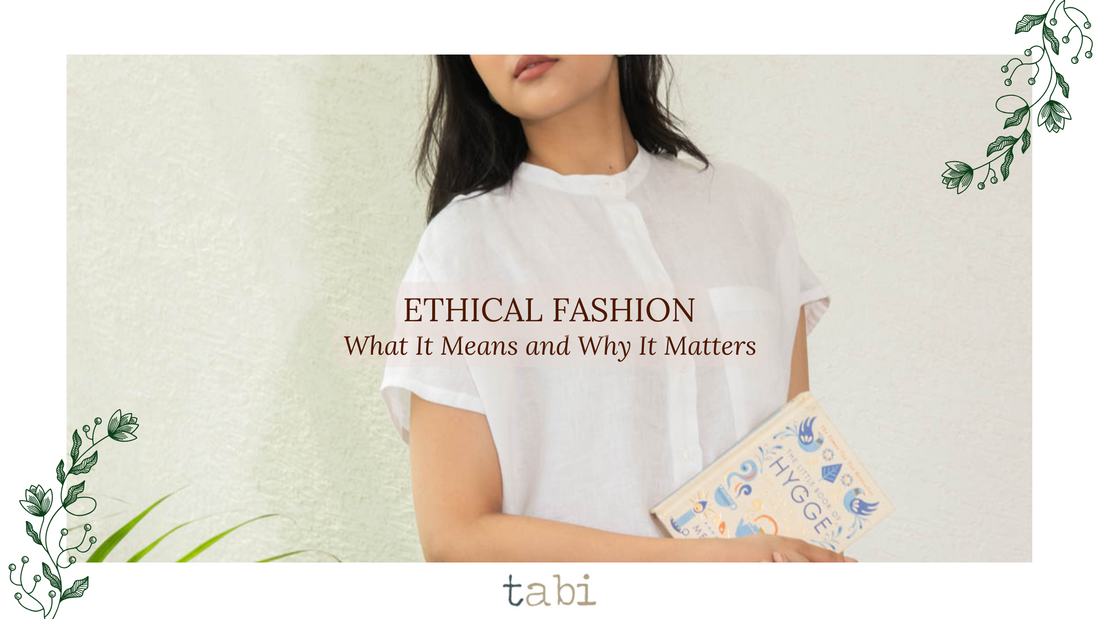
Ethical Fashion: What It Means and Why It Matters
Ethical fashion has emerged as a transformative movement within the global apparel industry in an era increasingly characterized by a profound awareness of social justice and environmental sustainability. This concept transcends mere consumerism, inviting us to reconsider the implications of our purchasing decisions and their far-reaching effects on people and the planet. As we delve into the essence of ethical fashion, it becomes clear that this is not just a trend; it represents a fundamental shift towards accountability, transparency, and sustainability in how we create and consume clothing.
Defining Ethical Fashion
At its core, ethical fashion encompasses a commitment to producing clothing and accessories in ways that prioritize environmental stewardship, social justice, and humane treatment of all beings involved in the production process. This multifaceted approach can be broken down into several key principles:
1. Sustainability: Ethical fashion emphasizes the use of eco-friendly materials and production methods. Sustainable materials, such as organic cotton, linen, and recycled fibres, minimize environmental impact and promote a circular economy. This principle advocates for practices that reduce waste and extend the life cycle of garments.
2. Fair Labor Practices: Central to ethical fashion is the commitment to fair labour practices. This means ensuring that workers are compensated fairly, work in safe conditions, and are afforded the right to organize. Brands dedicated to ethical practices maintain transparency throughout their supply chains, allowing consumers to understand the conditions under which their clothing is made.
3. Animal Welfare: Ethical fashion also addresses the treatment of animals in the fashion industry. Brands that adhere to ethical standards often avoid materials derived from animal cruelty, opting for cruelty-free alternatives that align with a compassionate ethos.
4. Cultural Respect: Ethical fashion recognizes the importance of preserving cultural identities and traditional craftsmanship. By collaborating with local artisans and communities, brands can support indigenous skills and promote economic empowerment, thus fostering a deeper connection between consumers and the stories behind their garments.
The Importance of Ethical Fashion
1. Environmental Responsibility
The fashion industry is one of the largest contributors to environmental degradation, with its reliance on resource-intensive practices leading to pollution, deforestation, and significant waste generation. According to the United Nations, the fashion industry is responsible for 10% of global carbon emissions, surpassing the combined emissions of international flights and maritime shipping. Ethical fashion presents a viable solution by advocating for sustainable practices that mitigate this impact.
Brands that prioritize sustainability utilize eco-friendly materials and production processes that significantly reduce their carbon footprint. For instance, the use of organic cotton not only avoids harmful pesticides but also conserves water—essential in a world facing increasing water scarcity. By supporting ethical fashion, consumers can play a pivotal role in fostering a more sustainable industry.
2. Empowering Workers
The rise of fast fashion has often been accompanied by exploitative labour practices, with workers facing abysmal conditions and receiving minimal compensation for their labour. Ethical fashion seeks to challenge this paradigm by championing fair labour practices that respect the rights and dignity of workers. By ensuring that production processes are humane and equitable, ethical brands empower individuals, particularly women and marginalized communities, thereby promoting social equity.
When consumers choose ethical brands, they are not merely purchasing clothing; they are investing in a system that values human rights and dignity. This conscious consumerism fosters a sense of responsibility and community, encouraging brands to uphold ethical standards.
3. Consumer Awareness and Empowerment
In an age of information, consumers wield unprecedented power to influence the market. The ethical fashion movement empowers individuals to make informed choices about the garments they purchase. By choosing to support brands that prioritize sustainability and social responsibility, consumers send a clear message: they demand transparency and accountability in the fashion industry.
This shift in consumer behaviour creates a ripple effect, prompting more brands to adopt ethical practices in order to meet the rising demand for responsible fashion. The potential for change lies within each purchasing decision, transforming shopping into an act of activism.
4. Cultural Preservation and Authenticity
Ethical fashion also plays a crucial role in preserving cultural heritage. Many ethical brands collaborate with artisans and craftspeople, ensuring that traditional skills and craftsmanship are honoured and passed down through generations. This collaboration not only empowers local communities economically but also celebrates cultural diversity.
By choosing ethically produced garments, consumers contribute to the preservation of unique cultural identities. This connection fosters a deeper appreciation for the artistry involved in clothing production, reminding us that each piece has a story worth telling.
5. A Vision for a Sustainable Future
As we confront the challenges posed by climate change and social inequality, the ethical fashion movement offers a hopeful vision for the future. It represents a call to action for both consumers and brands to prioritize sustainability and social justice. By embracing ethical fashion, we can collectively pave the way for an industry that values quality over quantity, and longevity over disposability.
The fashion landscape is evolving, and ethical fashion is at the forefront of this transformation. As technology advances, new innovations in sustainable materials and production methods will continue to emerge, further enhancing the potential for positive change.
6. Challenges and the Path Forward
While the ethical fashion movement is gaining traction, several challenges remain. The fast fashion model remains deeply entrenched in consumer culture, characterized by rapid production cycles and low prices. This pervasive mindset can hinder the adoption of ethical practices. Additionally, the price point of ethically produced garments can often be higher, raising concerns about accessibility for low-income consumers.
Conclusion
Ethical fashion represents a pivotal shift in how we approach clothing and consumption. It calls us to reflect on our values and consider the broader implications of our choices. By prioritizing sustainability, fair labour practices, and cultural respect, ethical fashion offers a pathway toward a more responsible and compassionate industry.
We have the ability to influence how fashion develops in the future as customers. By supporting ethical brands and making conscious purchasing decisions, we contribute to a narrative that champions social justice, environmental stewardship, and cultural preservation. In a world that increasingly values authenticity and integrity, ethical fashion is not merely a choice; it is a commitment to a better, more equitable future for all.
FAQs
1. What is ethical fashion?
Ethical fashion refers to clothing and accessories produced with a focus on sustainability, fair labour practices, and animal welfare. It involves using eco-friendly materials, ensuring safe and fair working conditions for workers, and promoting transparency in the supply chain. The goal is to minimize environmental impact and create a positive social impact through fashion.
2. How does ethical fashion impact the environment?
Ethical fashion aims to reduce the industry's environmental footprint by promoting sustainable practices. These include using organic or recycled materials, minimizing water consumption, and reducing waste through methods like upcycling and recycling. By choosing ethical fashion, consumers can help combat pollution, deforestation, and resource depletion associated with conventional fashion practices.
3. Are ethical fashion items more expensive?
Ethical fashion items can be more expensive than fast fashion counterparts due to the higher costs associated with sustainable materials, fair wages for workers, and ethical production methods. However, many consumers view these items as investments in quality and longevity, as ethical fashion often emphasizes durability and timeless design. Additionally, there are a growing number of brands offering affordable ethical options.
4. How can I identify ethical fashion brands?
To identify ethical fashion brands, look for certifications and labels that indicate sustainable and fair practices, such as Fair Trade, GOTS (Global Organic Textile Standard), or B Corp certification. Research the brand’s mission statement and supply chain transparency, and read reviews to understand their ethical commitments. Many brands also share their production processes and the stories of the artisans involved on their websites.
5. What can I do to support sustainable Fashion?
You can support ethical fashion by choosing to shop from brands that prioritize sustainability and fair labour practices. Additionally, consider buying second-hand clothing, participating in clothing swaps, and donating or recycling garments to reduce waste. Educating yourself and others about the importance of ethical fashion can also amplify the movement, encouraging more brands and consumers to make responsible choices.
